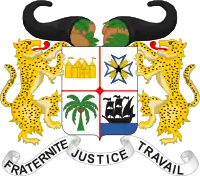2021 Beninese presidential election
Presidential elections will be held in Benin on April 11, 2021. These elections will elect the President of the Republic of Benin to a five-year term. Incumbent president Patrice Talon is seeking his second term in office.
| |||||||||||
| |||||||||||
| |||||||||||
 |
|---|
| This article is part of a series on the politics and government of Benin |
|
|
Background
The 2016 presidential elections saw the election of Patrice Talon, who won in the second round of voting with more than two-thirds the number of votes than his opponent Lionel Zinsou, Prime Minister running under outgoing president Thomas Boni Yayi's Cowry Forces for an Emerging Benin party. Benin has a reputation for being a stable democracy on the African continent.[1]
Upon becoming president, Talon undertook swift economic reforms aimed at liberalization. This provoked protests and strikes in the country and, in return led to the government tightening regulations on public protests, which led to accusations of authoritarianism. In parallel, the president has attempted to combat corruption in the country. During the presidential campaign, Talon highlighted good governance as one of his key themes, including the introduction of a single presidential term, which he called a "moral requirement". However, this reform was blocked by Parliament who refused to create the precedent that a president could modify the constitutional terms of his mandate.
Political crisis
The approval and reputation of President Talon were seriously damaged in the wake of the 2019 parliamentary elections, which saw the government drastically restrict the eligibility of political parties, with only two pro-government parties able to run. The Union progressiste and the Bloc républicain, the two pro-government parties created for the election, won all the seats in parliament, totally excluding any opposition parties. Opposition parties called for a boycott of the election, which led to a record low 23% voter turnout, down from 65% in the previous election.[2]

The opposition again accused the president of authoritarianism and called for an end to the vote-counting process and the organization of new elections without success.[1][3][4] Two days after the election, Amnesty International released a statement denouncing "the wave of arbitrary arrests of political activists and journalists and the repression of peaceful protests".[5] The election was also marked by a complete Internet shutdown on the day of the vote, an action criticized by the opposition, civil society and international observers, as well as viewing the level of repression on the part of the government "alarming".[6][7][8][9] The days following the election involved violent clashes between protesters and security forces, the latter firing tear gas and live ammunition and protesters burning tires and throwing various objects.[10][11] Amnesty International denounced the death of four protesters as well as continued arbitrary arrests, which led to the serious injury of another protester. A strong security contingent was deployed on the streets of Cotonou and Porto-Novo leading up to the investiture ceremony for the new Assembly. Para Commandos, anti-riot vehicles, the CRS and units of the Republican Guard were all deployed to maintain order.[12][13]
Nevertheless, a six-month political dialogue process led to an agreement on rules regarding electoral participation. During the 2020 municipal elections, only five political parties were validated by the central election authority, down from 34 parties and alliances in the 2015 municipal elections.[14][15] The Cowry Forces for an Emerging Benin was the only opposition party to exceed the 10% vote threshold needed for representation.[16] This has led to many now considering democracy in Benin flawed, due to a restrictive and authoritarian bent, a loss of political pluralism, and key political rivals of President Talon either in exile or excluded from political participation.[17][18]
Preparation for the 2021 elections
As the 2021 elections approach, the incumbent president was seen as theoretically the only person able to run as a candidate. A 2019 revision to the constitution imposed a requirement that candidates need receive the nomination of 10% of the total MPs and mayors (about 16 sponsors). However, 160 of the electoral officials (83 Members of Parliament and 77 mayors) concerned belong to pro-government parties.[18][19] Only six mayors belonging to the Cowry Forces for an Emerging Benin make up the opposition, with the party lacking a Member of Parliament.[20] President Talon promised to "do everything" to organize an inclusive, open ballot for his opponents to obtain nomination, a move seen by opposition parties as the president's way to "cherry pick" his challengers.[21][22] The Cowry Forces and the Democrats (a new party created by supporters of former president Boni Yayi) fear they will be designated as Trojan Horses by President Talon.[23]
Electoral system
The president of Benin is elected by a two-round system to a five-year term that is renewable once. If no candidate receives a majority of the vote in the first round, the top-two candidates compete in a second round organized within fifteen days of the first round.[24] After a constitutional amendment adopted in November 2019, each presidential candidate has to run with a vice-presidential candidate. This running mate also has a five-year term and is charged with completing the president's term in case of impeachment or other impediment.[25]
Candidates for the presidency have to be a Beninese citizen, either by birth or from having lived in Benin for the past ten years, be of "good character and great probity", have all their civil and political rights, be between the ages of 40 and 70, and submit to a physical and mental assessment by three doctors sworn in by the Constitutional Court.[24] A 2019 constitutional amendment also requires candidates to be nominated by no less than 10% of the total of Members of Parliament and Mayors, or about 16 officials.[19]
Candidates
Candidates have until February 4 to obtain the nominations necessary and announce their candidacy.[26] Twenty people, including incumbent President Patrice Talon, enrolled as candidates.[27]
Law professor Frédéric Joël Aïvo was the first to declare his candidacy.[28] Several opposition leaders have supported a coalition backing Aïvo.[27] President Talon announced his intention to run for another term on January 15, 2021, breaking his 2016 promise to run for one term.[29] The next week, Talon revealed his running-mate, Vice President of the Assembly Mariam Chabi Talata Zime. The choice came as a surprise to observers, as Zime was not one of the names advanced by the pro-government parties and the president chose an alternative when the two parties were unable to agree.[29][30] Zime would be Benin′s first female vice president if elected.[27]
Results
Provisional results from the Autonomous National Electoral Commission (CENA) are expected on April 13, while the final results will be certified by the Constitutional Court on April 20.[26]
References
- "Bénin : une abstention massive aux législatives pour protester contre le gouvernement". Le Monde (in French). 2019-04-28. Retrieved 2019-05-01.
- "Au Bénin, l'opposition privée d'élections législatives". Le Monde (in French). 2019-03-06. Retrieved 2021-01-29.
- "Bénin : sale temps pour Cotonou". Le Point (in French). 2019-04-29. Retrieved 2019-05-01.
- "Législatives au Bénin : l'opposition lance un ultimatum à Patrice Talon au lendemain du scrutin". Jeune Afrique (in French). 2019-04-30. Retrieved 2019-05-01.
- "Bénin : en l'absence de l'opposition, abstention massive aux législatives". France 24 (in French). 2019-04-29. Retrieved 2019-05-01.
- "Bénin. Couper Internet le jour du scrutin est une attaque directe contre la liberté d'expression". www.amnesty.org (in French). Retrieved 2019-05-01.
- "Les résultats des législatives espérés jeudi". VOA (in French). Retrieved 2019-05-01.
- "Législatives: le Bénin toujours dans l'attente des résultats". TV5 Monde (in French). 2019-04-30. Retrieved 2019-05-01.
- "Législatives au Bénin: la Commission électorale confirme la faible participation". RFI Afrique (in French). Retrieved 2019-05-01.
- "Retour au calme au Bénin après les violences post-électorales". France 24 (in French). 2019-05-02. Retrieved 2019-05-17.
- "Bénin : heurts autour du domicile de Boni Yayi". TV5MONDE (in French). 2019-05-02. Retrieved 2019-05-17.
- "Bénin: installation de la nouvelle législature sous haute sécurité". RFI Afrique (in French). Retrieved 2019-05-17.
- "Bénin: le ministre de l'Intérieur reconnaît l'usage d'armes par la police". RFI Afrique (in French). Retrieved 2019-05-17.
- "[Édito] Les municipales au Bénin, un test démocratique – Jeune Afrique". Jeune Afrique. 2020. Retrieved 20 April 2020.
- "Elections communales et municipales de mai 2020: L'ordre de passage des partis sur les médias validé - La Nation Bénin". La Nation Bénin. 2020. Retrieved 20 April 2020.
- "Les résultats des élections municipales du 17 mai 2020". 24 Hau Benin. Retrieved 24 May 2020.
- "Au Bénin, quatre ans après l'élection de Patrice Talon, la dérive autoritaire". Le Monde. 2020. ISSN 1950-6244. Retrieved 30 December 2020.
- "Au Bénin, une démocratie qui chancelle et inquiète, à cinq mois de la présidentielle". Le Monde. 2020. ISSN 1950-6244. Retrieved 30 December 2020.
- "Présidentielle 2021 au Bénin: "Il n'y a aucun risque d'exclusion", Alain Orounla". Bénin Web TV. 2020. Retrieved 30 December 2020.
- "Parrainage au Bénin : vers une élection présidentielle exclusive ?". Afrik. 2021. Retrieved 7 January 2021.
- "Présidentielle au Bénin: la main tendue de Patrice Talon à l'opposition". RFI. RFI. 2020. Retrieved 30 December 2020.
- "Bénin : La Présidentielle fixée au 11 April 2021, Patrice Talon promet de faire participer l'opposition". KOACI. Retrieved 30 December 2020.
- "Présidentielle 2021 : "Patrice Talon va désigner un candidate pour Les Démocrates"". Banouto. Retrieved 30 December 2020.
- "Bénin, Constitution du 11 décembre 1990, MJP". Digithèque MJP. Retrieved 30 December 2020.
- "Le Bénin se dote d'un vice-président". Deutsche Welle. Retrieved 9 January 2021.
- "Présidentielle 2021 au Bénin : la CENA dévoile le calendrier électoral". Afrik. 2020. Retrieved 7 January 2021.
- "Benin's president Talon files candidacy for April vote". msn.com. AFP. February 5, 2021. Retrieved February 5, 2021.
- "Présidentielle au Bénin : Joël Aïvo ira " jusqu'au bout "".
- "Présidentielle 2021/ Flou à propos du colistier du chef de l'État: Le Vice-président, un choix apparemment difficile pour Talon et sa mouvance". Matin Libre. Retrieved 21 January 2021.
- "Présidentielle au Bénin: Talon choisit la vice-présidente de l'Assemblée comme colistière". RFI. 2021. Retrieved 24 January 2021.
.jpg.webp)
